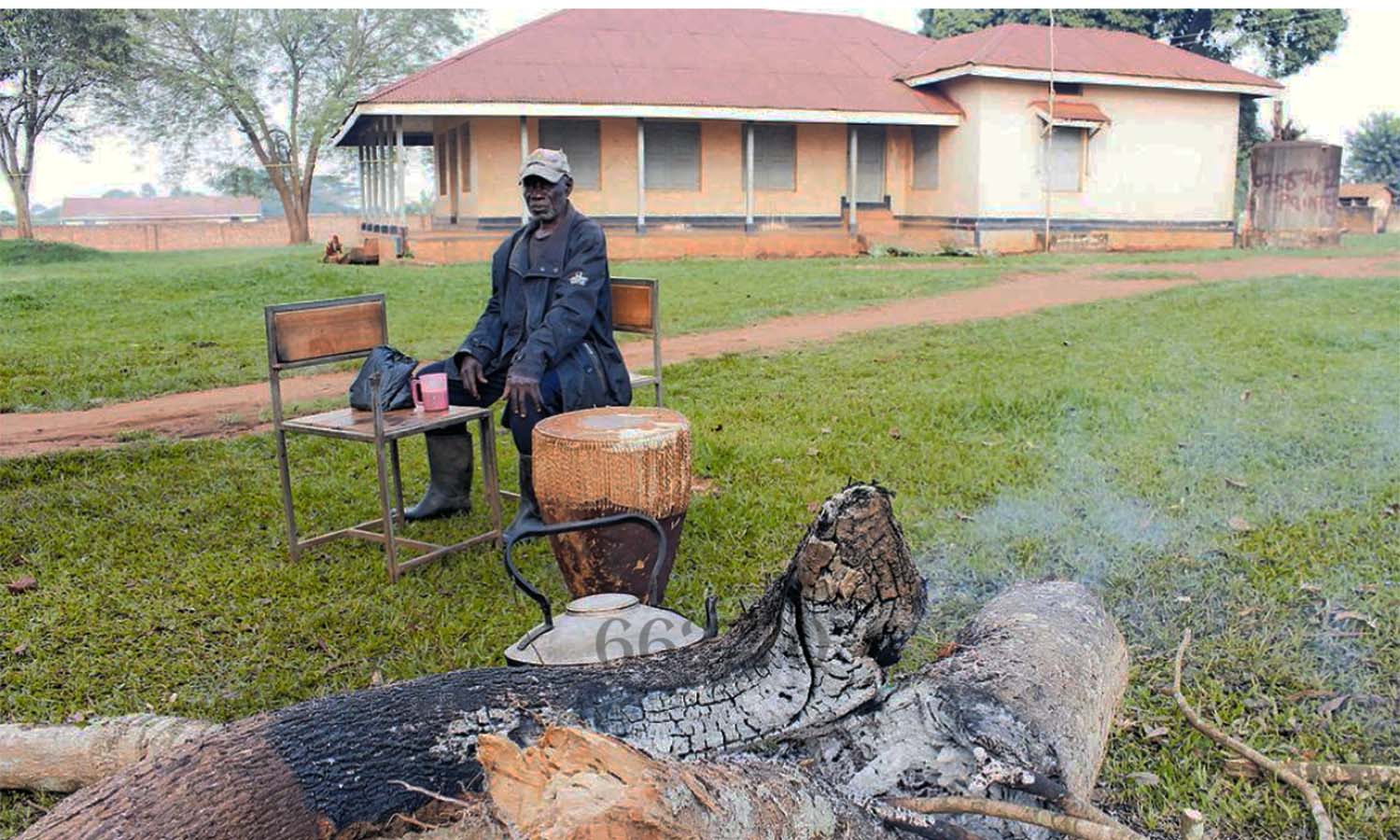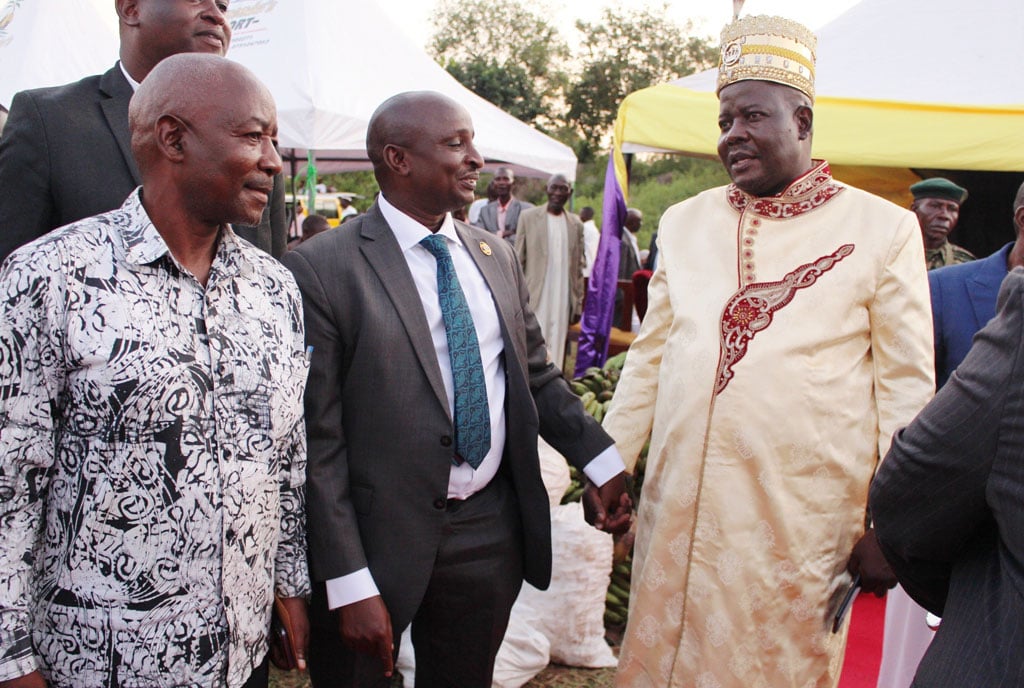
Mr David Mutyabule, the care taker of Buganda Kingdom property in Ntenjeru, Kayunga District sits near a bonfire one of the contested buildings in October 2024. Photo/Fred Muzaale
For the last two decades, Buganda Kingdom officials have been at loggerheads with leaders of the Banyala ethnic group in Kayunga District.
Two weeks ago, some of the Ssabanyala’s subjects, including cabinet officials, broke into a Buganda Kingdom building in Ntenjeru, Kayunga District, placed their furniture inside and set up tents outside.
The Ssabanyala is the cultural leader of Banyala.
The officials claimed they were reclaiming property that the central government had returned to them under a 2013 Memorandum of Understanding (MoU) signed between President Museveni and the Kabaka. According to them, the government was implementing the agreement selectively in favour of the Buganda Kingdom.
However, Buganda Kingdom accused the Banyala of misinterpreting the 2013 MoU.
As news of the Buganda Kingdom property seizure spread, some loyalists and local chiefs arrived at the scene to evict the "intruders," escalating tensions.
During the standoff, Mr Samuel Bukenya, the Ssabanyala’s cabinet minister for Kampala Affairs, was arrested by police and briefly detained at Kayunga Central Police Station before being released on bond.
Security forces, led by Ssezibwa Regional Police Commander Jafari Magezi condemned the Banyala for breaking into the building. Mr Magezi said police are still investigating the incident and urged all residents in Kayunga to maintain peace and order.
Who is fueling this conflict?
A section of Kabaka’s local chiefs in Kayunga accuse Mr Andrew Muwonge, the district chairperson, of fueling the fresh conflict. Mr Muwonge is a Munyala.
This is because two days before the Bunyala cabinet officials broke into the buildings, they met Mr Muwonge in his office and asked him to prioritise issues of the Banyala.
The Bunyala Kingdom premier, Rev, Wilson Galimaka, attended the meeting.
Ms Margaret Ssempala, the Kabaka’s chief in charge of Kayunga sub-county, says: "We are shocked that our son Muwonge has decided to act in such a manner as to give away the Kabaka's properties to the Banyala."
Mr Muwonge has denied the allegations.
Mr Martin Ssenkatuka, the former Banyala Chiefdom Prime Minister, says some officials in Mengo think that small chiefdoms within Buganda have no rights over their own properties, which is the reason they keep ignoring their concerns.
Mr James Rwebikire, the Ssabanyala’s principal private secretary blames the unending conflict between the two ethnic groups on the failure by the government to implement the 2013 MoU.
"The NRM government has failed to implement what took it to the bush to fight inequalities. The MoU is being implemented selectively in favour of the Buganda Kingdom. The law favours the big tribes. We have been marginalized in terms of jobs and we are not near the national cake," Mr Rwebikire says.
However, Ms Mariam Seguya, the Kayunga Resident District Commissioner, says: "We are yet to find out whether there is someone who is a catalyst to this conflict. It could be that the Banyala doing it."
The RDC says in an effort to ease tensions she invited leaders from the opposing ethnic groups to a meeting last week to seek a lasting solution to the conflict but they snubbed the meeting.
"I received reports that a section of the leaders from the Banyala said I cannot mediate in the wrangle. But I think there should be dialogue between the leaders from both groups," Ms Seguya says.
Prof Mwambutsya Ndebesa,a political analyst and Makerere University lecturer, says the latest scuffle in Kayunga is part of the “unending Bunyoro-Buganda question”. Prof Ndebesa explains that the history of the region is disputed, pointing out that Bugerere was originally part of Bunyoro territory.
"Those communities want recognition in Buganda. Cultural inclusiveness is at the heart of this struggle," Prof Ndebesa said.
Prof Ndebesa advises that to resolve the conflict, the Mengo establishment should implement a systematic plan for cultural inclusiveness, ensuring that people feel their dignity, chiefs, and clans are recognised.
While the Banyala seek secession from the Buganda Kingdom, Prof Ndebesa advises that they should instead advocate for recognition by Mengo, rather than pursuing separation.
"Buganda is not a tribe, but a nation. So, Buganda should not pursue the policy of assimilation. They should pursue a policy of unity in diversity," he notes.
Political analyst Charles Rwomushana argues that there is no real conflict between Buganda and the Banyala; rather, he describes the situation as "confusion."
He says present-day Bugerere (Kayunga District) was originally part of the Bunyoro Kingdom but became part of the Buganda Kingdom through territorial expansion.
"Nyamuyonjo who defeated the Bachwezi on the frontline of Kayunga was not a Muganda. So, the Baganda claiming those areas of Kayunga is also incorrect. These districts are in Buganda by cooperation or charter," he says.
Background
In 2009, the hostility between Bunyala and Buganda reached a boiling point when the former protested a planned visit by the Kabaka Ronald Mutebi II to Kayunga, leading to the infamous Buganda riots that left at least 40 people dead.
In September 2021, the Baruuli and Banyala communities demanded full control of land and buildings within the Nakasongola and Kayunga districts, areas also claimed by the Buganda Kingdom.
Through the "My Land, My Life" campaign, Baruuli and Banyala leaders accused the Buganda Kingdom of denying them their land rights, stating they would no longer tolerate this.
They argued that Section B, Clause IV of the 2013 MoU signed by President Museveni and Kabaka Ronald Mutebi II grants them the right to use lands where the Buganda Kingdom had established administrative units. However, they allege that the kingdom has deliberately withheld these properties from them.
The section states: “The Kabaka shall respect the cultural norms of other related ethnic communities located in Buganda such as the Banyala and Baruuli and leave to them land where the former administrative units were situated as amicably agreed by both parties.”
Furthermore, they claimed that much of the land at the sub-county and Ssaza administrative levels, which was returned to them under the MoU, has been sold off by certain "unscrupulous" officials from the Buganda Kingdom in these two districts.
“We have come up with a collective voice to sound an ultimatum to the Mengo establishment. Since the signing of the agreement in 2013 where Mengo was by law required to act in line with all the provisions of the agreement, Mengo officials have stepped up a provocative approach including acts of aggression in total disregard of the agreement. We have been denied access and full utilisation of the mentioned land,” Isabaruuli Constantine Mwogezi Butamanya said then.
The function was also attended by the Banyala cultural leader Baker Kimeze.
Mr Butamanya said they have made several petitions against the provocative acts by some officials in Mengo, the seat of Buganda Kingdom, but no action has been taken.
“The 2013 agreement where both President Museveni and the Kabaka of Buganda appended their respective signatures is being abused by a section of Mengo officials under the watch of both the government and the Kabaka of Buganda,” he added.

Kayunga Resident District Commissioner Mariam Sseguya (centre) and Ssezibwa Regional Police Commander Jafari Magezi (right) talk to Rev Wilson Galimaka, the prime minister of Bunyaala Chiefdom, after a section of the Banyaala broke into Buganda Kingdom property in October 2024. Photo/Fred Muzaale
Mr Samuel Kasirye, the Buruuli Chiefdom Prime Minister, claims Mengo agents recently sold off a plot of land adjacent to the Nakasongola District headquarters on Sasira Road.
“This is among the many acts that show acts of provocation and aggression while ignoring the contents of the agreement. We have decided to take the land matters to the next level as Baruuli and Banyala cultural groups that have an equal stake in Uganda,” he says.
Kayunga Resident District Commissioner Mariam Sseguya says she invited leaders from the opposing ethnic groups to a meeting last week to seek a lasting solution to the conflict but they snubbed the meeting.
"I received reports that a section of the leaders from the Banyala said I cannot mediate in the wrangle. But I think there should be dialogue between the leaders from both groups," Ms Seguya says.
Conflict
Buganda is not a tribe, but a nation.
So, Buganda should not pursue the policy of assimilation. They should pursue a policy of unity in diversity. Prof Mwambutsya Ndebesa, a political analyst and Makerere University lecturer, says the latest scuffle in Kayunga is part of the “unending Bunyoro-Buganda question”.
Prof Ndebesa explains that the history of the region is disputed, pointing out that Bugerere was originally part of Bunyoro territory.
"Those communities want recognition in Buganda. Cultural inclusiveness is at the heart of this struggle," Prof Ndebesa said.
Prof Ndebesa advises that to resolve the conflict, the Mengo establishment should implement a systematic plan for cultural inclusiveness, ensuring that people feel their dignity, chiefs, and clans are recognised.
Reactions
Efforts to get a comment from Buganda Kingdom were futile by press time.
However, Mr Joseph Kawuki, the Buganda Kingdom local government minister in an earlier interview accused the Banyala of misinterpreting the 2013 MoU, asserting that the agreement didnot give Buganda Kingdom land and other properties in Kayunga and Nakasongola to the Banyala and Baruuli respectively.
Efforts to get a comment from the central government were futile by press time.
The deputy presidential press secretary, Mr Faruk Kirunda, and Mr Chris Baryomunsi, the ICT and National Guidance minister did not answer our calls.
The same goes for State minister for Gender and Culture, Ms Peace Mutuuzo.
While the Banyala seek secession from the Buganda Kingdom, Prof Ndebesa advises that they should instead advocate for recognition by Mengo, rather than pursuing separation.
"Buganda is not a tribe, but a nation. So, Buganda should not pursue the policy of assimilation. They should pursue a policy of unity in diversity," he notes.
Political analyst Charles Rwomushana argues that there is no real conflict between Buganda and the Banyala; rather, he describes the situation as "confusion."
He says present-day Bugerere (Kayunga District) was originally part of the Bunyoro Kingdom but became part of the Buganda Kingdom through territorial expansion.
"Nyamuyonjo who defeated the Bachwezi on the frontline of Kayunga was not a Muganda. So, the Baganda claiming those areas of Kayunga is also incorrect. These districts are in Buganda by cooperation or charter," he says.






